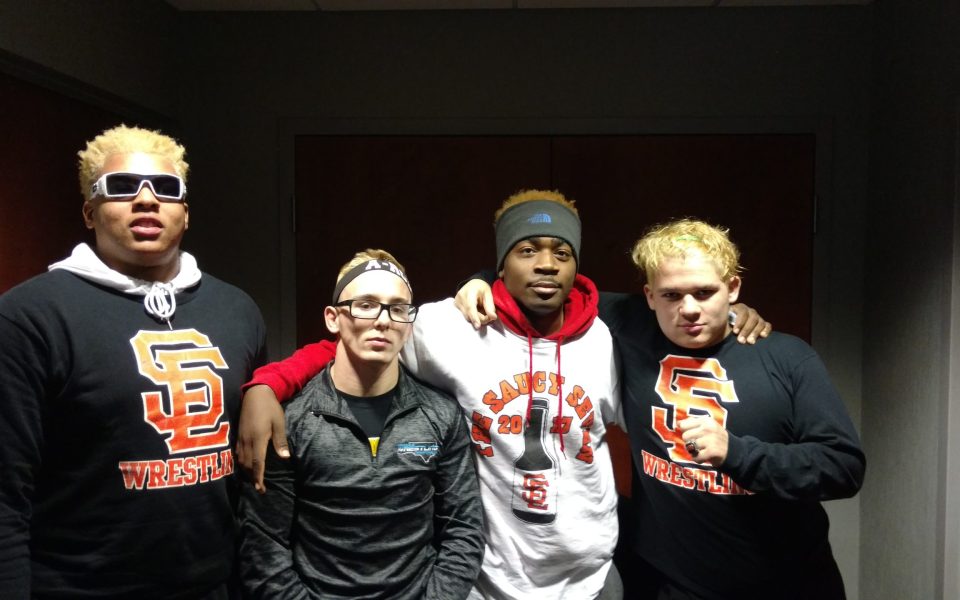Levi Henry West threw open the door to Suite 109 at the Greensboro Coliseum.
“Hey guys, I brought the press!” he yelled out. His declaration was both triumphant and cautionary.
Everyone in the room looked up for a second, then turned their attention back to the card game.
It was the last break before the final matches, the calm before the storm.
Out on the coliseum floor, seen through the suite’s wide, glass window, the crew switched out the mats; four new ones spanned the length of the basketball court while the 10 sweaty used ones that had covered the entire stadium floor were rolled up and taken away.
The once-sizable audience, now whittled down to several hundred supporters, sought out restrooms and nacho stands. Debate, predictions and memories filled the arena.
Feb. 18 was the final day of the North Carolina High School Athletic Association’s 80th annual wrestling state championships, a three-day tournament coming to its peak.
A half hour earlier the Coliseum brimmed with the cries of battle. At any moment 10 matches raged at once: 20 young men fighting their hearts out in short bursts of struggle at the highest intensity — a contest as old as sport itself.
All around the stands, pockets of supporters adorned in school colors exploded in unexpected ovation. Barrel-chested coaches bear-hugged one another at the blow of a whistle. Young men up to 285 pounds picked each other completely off the ground, slammed one another onto the mats, grasped for each others’ legs and arms and torsos. They summoned every ounce of themselves: For air and escape, for an upper hand, for a key piece of leverage, for victory.
By the time West burst into Suite 109, only the final four wrestlers from each school size classification (1A, 2A, 3A and 4A) and from each weight class took the floor. But with 14 weight classes for each classification, this meant 56 matches remained.
Weight classes range from 106 to 285 pounds, and the 12 classes in between vary in distance from one another. (For example, only six or seven pounds separate the first few classes — 106, 113, 120, 126 — but the intervals lengthen on the other end — 182, 195, 220, 285.)
A weight class signifies the maximum weight — meaning, for example, no more than 106 pounds, no more than 182 pounds, or 220 pounds, and so on. This indicates the need to “maintain weight,” as a wrestler might mention.
And the necessity makes sense. Say someone weighs in at 219 pounds. He’s in luck: He’ll be facing off against wrestlers from 196 to 220 lbs. But if instead he weighs in at 221, he might be up against someone who weighs 64 pounds more than him, coming in at a terrifying 285.
The conditioning required to maintain weight is part of the reason, West assured, that wrestling is the toughest sport there is.
“I might have a few crackers,” he said. “I might eat a piece of chicken, half a breast, and have eight ounces of water and that’s it all day.”
Since football season in the fall, he has lost nearly 60 pounds to make the 220 weight class.
West, 17, is a junior at Southeast Guilford High School. His tournament run was over by this point, though he did defeat his final opponent in the last seconds to make fifth place.
“I’m winning next year,” he promised.
The Southeast Guilford Falcons brought seven members of their varsity team to the state championships.
“We’re the Saucy Seven,” West said proudly. “Check out the shirts.”
Indeed, fellow wrestler Michael Johnson wore a T-shirt labeled “The Saucy Seven” along with logos representing the school, the year and a tall bottle of sauce.
[pullquote]Other Triad high schools participated in the NCHSAA state championships:
In the 1A classification, Atkins placed 34th.
In 2A, Carver tied for 52nd.
In 3A, Northern Guilford placed 22nd, Southern Guilford 38th and Eastern Guilford 47th.
In 4A, West Forsyth placed 2nd, Smith 3rd, Southwest Guilford 11th, Ragsdale 12th, High Point Central 30th, Northwest Guilford and Glenn tied at 34th and Page 52nd.[/pullquote]
Still competing in the tournament were Johnson, Evan Surgeon and Austin Robinson — all of whom were playing cards carelessly in the team’s suite — as well as Carson Smith, who wasn’t present at the time.
The young men kept each other calm, it seemed. They’d been through it all together.
“Practice is hard,” West said. “You have to constantly pull everyone up with you.”
Later that evening, Johnson and Robinson would both fall to their opponents.
Smith and Surgeon, however, emerged victorious. They led the Falcons to the 4A championship with a 115-98 margin over second place West Forsyth.
Back in the suite, West had been confident of a championship, though it all seemed overshadowed by the teammates’ camaraderie.
“It’s been one heck of a season, and we all did it together,” he remarked.
“There is no white and black on our team — it’s all orange,” he ventured, referring to the school colors.
Then he paused.
“You’re gonna put that part in there, right?” he added smiling.
Join the First Amendment Society, a membership that goes directly to funding TCB‘s newsroom.
We believe that reporting can save the world.
The TCB First Amendment Society recognizes the vital role of a free, unfettered press with a bundling of local experiences designed to build community, and unique engagements with our newsroom that will help you understand, and shape, local journalism’s critical role in uplifting the people in our cities.
All revenue goes directly into the newsroom as reporters’ salaries and freelance commissions.


Leave a Reply